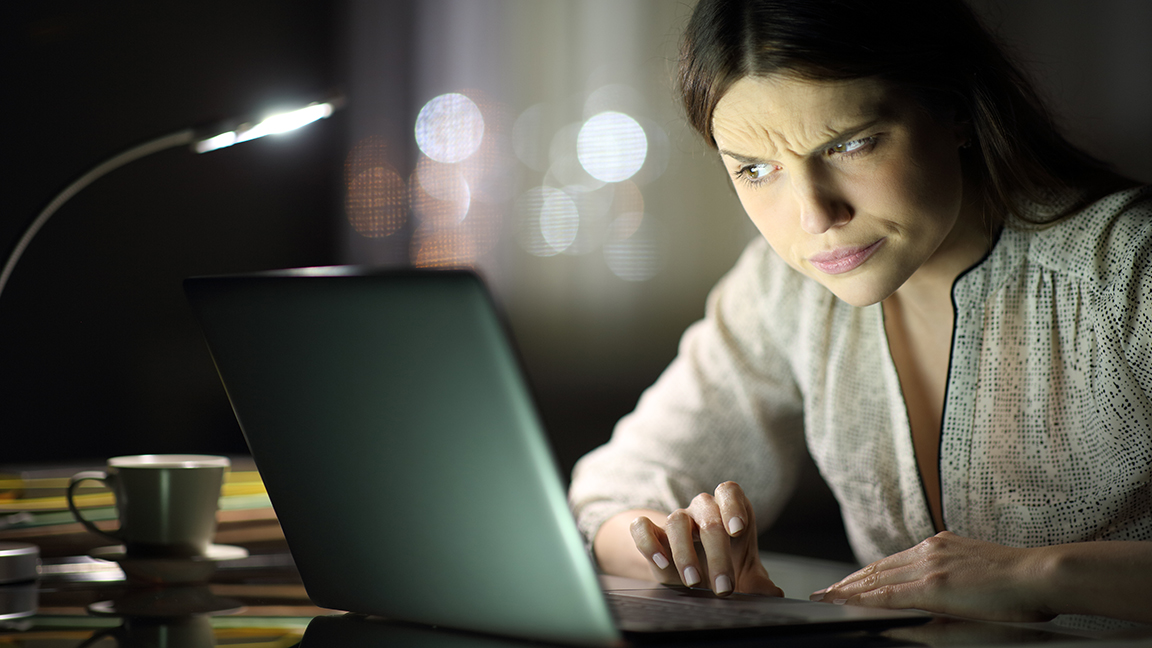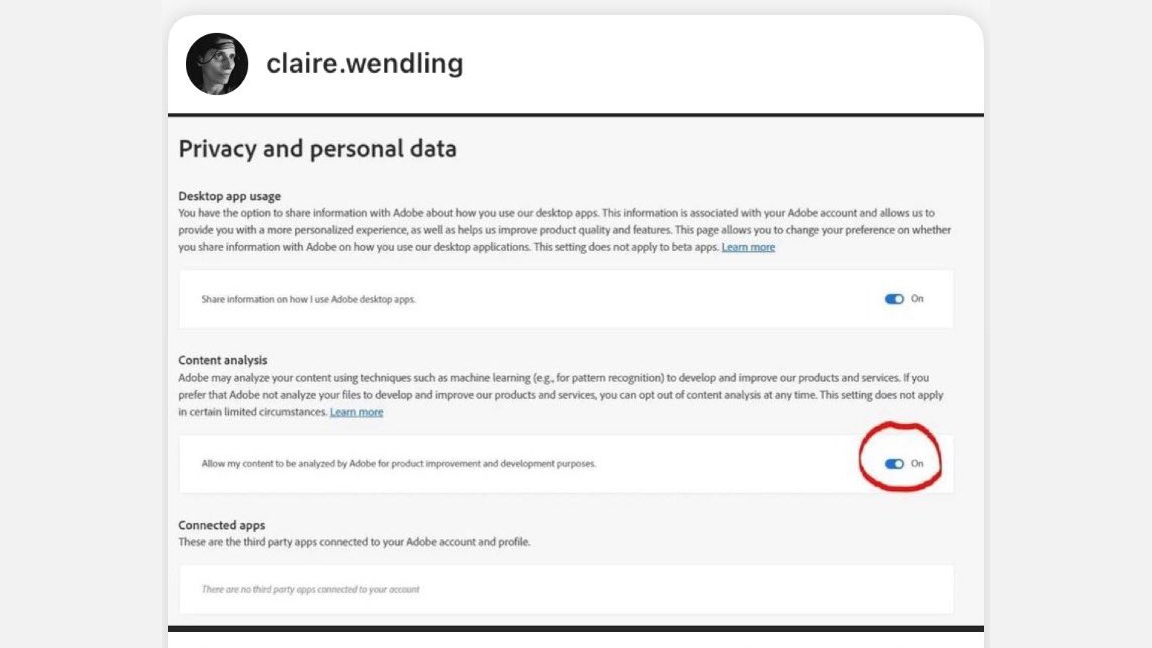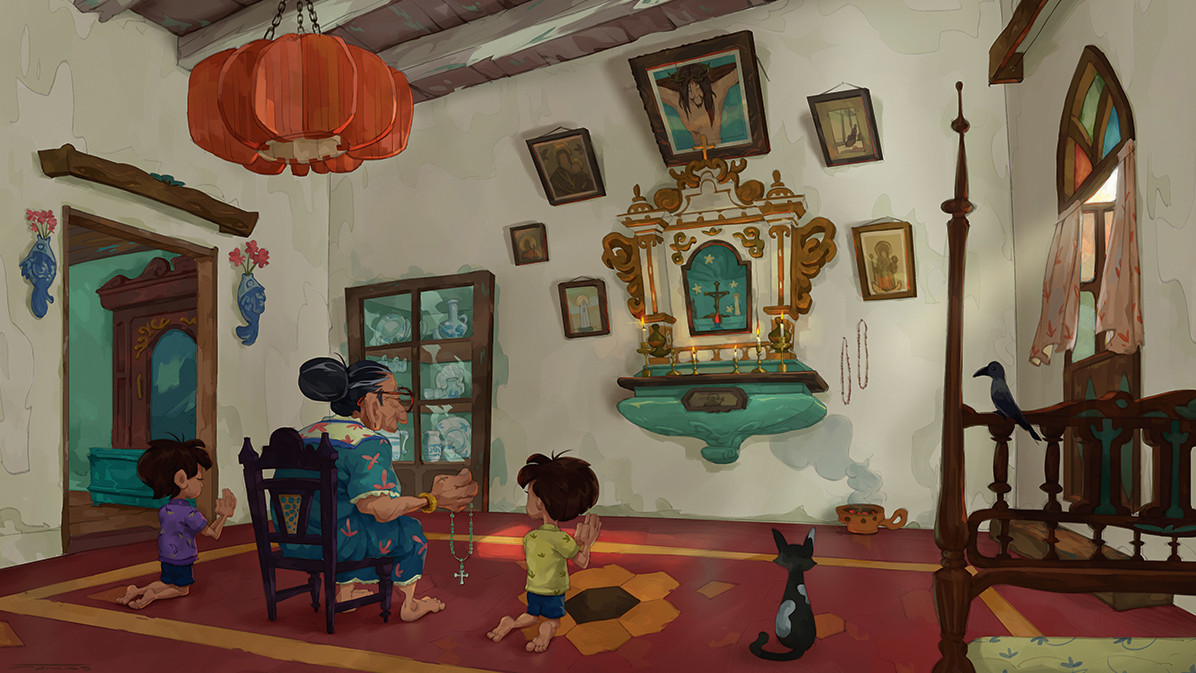
It feels like AI art is taking over everything and artists are struggling to know what and who to trust, especially when favoured creative brand Adobe could be sneakily signing up users to its AI 'machine learning' algorithm, Sensei.
Recently, French comic artist Claire Wendling noticed Adobe’s privacy and personal data settings had a curious automatic opt-in – Photoshop has permission to 'analyse your content using techniques'. Basically, unless a user unticks this box Adobe's AI will record and store how you use Photoshop, an artist's workflow and habits, and use that data to… well, train its AI to replicate the actions. That's the rub.
It's not the first time artists have concerns over how AI is being used to 'steal' art; recently the ArtStation homepage filled with anti-AI art as the community realised the site, the world's largest art portfolio platform, was hosting AI art – some of which was created using art by those who use the site.
Neither is it as creepy as the trend for turning games and cartoons into real life shows, such as the fan-made AI Family Guy remake that featured creepy hands and toothy smiles.
Check out Claire Wendling's Instagram post below, as tweeted by artist Jon Lam, which has millions of views and over five thousand retweets.
Watch out for Adobe automatically Opting you In for “Machine learning” aka Ai. Also, tech companies that glorify “Opting out” options are using this to shift responsibility of Data mining onto US. Sneaky. Meanwhile Ai never forgets. It’s theatre. #adobe #OptOut pic.twitter.com/pMmdM4SBq6January 3, 2023
Adobe responded over at FastCompany, where a spokesperson sent a written statement: "When it comes to Generative AI, Adobe does not use any data stored on customers’ Creative Cloud accounts to train its experimental Generative AI features. We are currently reviewing our policy to better define Generative AI use cases."
The approach to AI use at Adobe is different to that of dedicated AI image generators and AI text-to-image apps; these scrape the internet for digital art and photography to manipulate into new images.
Get the Creative Bloq Newsletter
Daily design news, reviews, how-tos and more, as picked by the editors.
Adobe's own AI, called Sensei, is a self-contained program on Adobe servers that doesn't connect to the broader internet or other AI. The difference, Adobe argues, is that AI Sensei is learning and not 'stealing'. Adobe uses its AI to improve the functions of its software; if you use Content Aware Fill, Sky Replace, Object Selection, Auto Tone or other tools, these were built on AI Sensei's learning. Photoshop's hover masking feature, for example, is fantastic.

The issue comes down to one of trust in a time of heightened anxiety amongst artists over their copyrights, ownership of art, and a trend that has seen AI 'art' apps scrape art without permission. Anger about AI generated art has already led to an artist being banned from Reddit for creating art that looks AI generated.
One of the largest and most popular AI art image generators, Midjourney is known to have not gained the permission of artists to use their work to train its AI. In an interview with Forbes, Midjourney's founder David Holz admitted to this in September 2022. (Get up to speed in our AI art generator comparison guide.)
It's why I can understand artists reacting to the Adobe post with outrage, for example @immortanjill wrote: "ugh what a crock. Thanks for the heads up, Jon. All this AI stuff is really speed running my inevitable Sarah Connor arc I swear."
Twitter user @karpour wrote: "I wouldn't expect anything less from Adobe than ripping off artists with subscriptions, and as the cherry on top sell out their work."
All this AI stuff is really speed running my inevitable Sarah Connor arc I swear.
@immortanjill
AI is becoming a toxic term for artists and software developers alike, as Adobe relies on user data to improve Photoshop and its tools. If users begin to opt out for fear of Adobe helping or developing text prompt AI image generators then it could make Photoshop weaker.
It doesn't help that Adobe decided to allow AI images into its stock library, which was announced on the Adobe blog in December 2022, causing concern amongst photographers.
Against this backdrop it's easy to see how a viral social post of an automatic opt-in for AI learning can set the watch fires of artists globally who rely on Adobe software. And Adobe needs to listen, as other software publishers have taken a stance to ban AI generators or have walked back on the intention to implement AI, such as Clip Paint Studio, one of the best art apps for iPad, that cancelled a planned AI generative art update.
Adobe's machine learning has been in Photoshop for nearly a decade and has helped develop the tools many of us take for granted, but at least now you are armed with the knowledge to opt out if you feel uncomfortable. As a rule, always check the T&Cs and for Photoshop, take a look at Adobe's privacy page for the full details. But for clarity, there is a difference between machine learning and the text-to-image AI that will dominate 2023 for all the wrong reasons.
Read more:

Thank you for reading 5 articles this month* Join now for unlimited access
Enjoy your first month for just £1 / $1 / €1
*Read 5 free articles per month without a subscription

Join now for unlimited access
Try first month for just £1 / $1 / €1

Ian Dean is Editor, Digital Arts & 3D at Creative Bloq, and the former editor of many leading magazines. These titles included ImagineFX, 3D World and video game titles Play and Official PlayStation Magazine. Ian launched Xbox magazine X360 and edited PlayStation World. For Creative Bloq, Ian combines his experiences to bring the latest news on digital art, VFX and video games and tech, and in his spare time he doodles in Procreate, ArtRage, and Rebelle while finding time to play Xbox and PS5.
